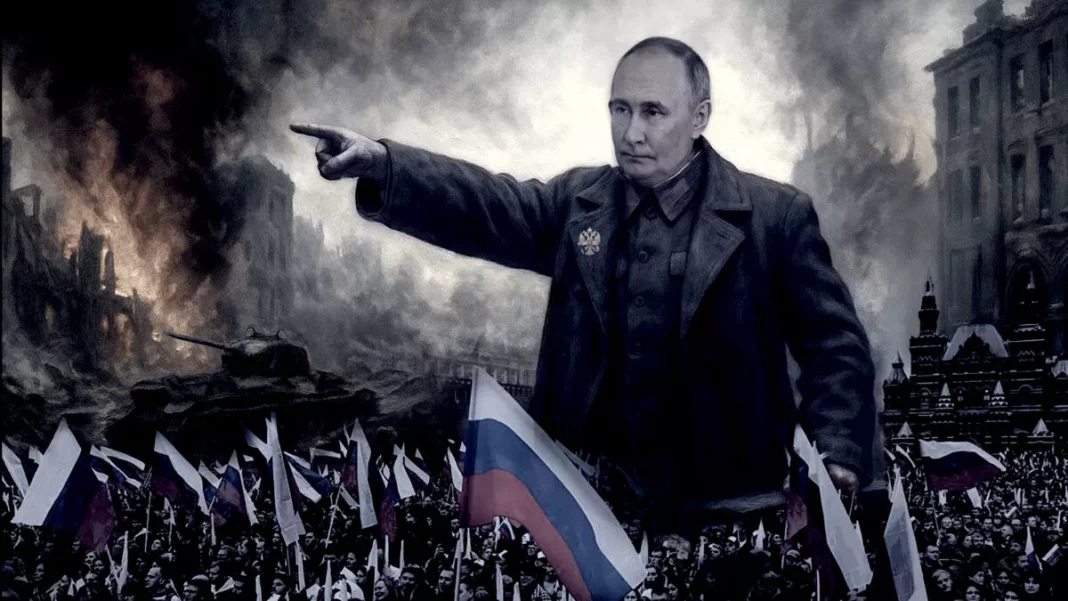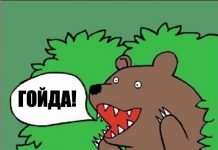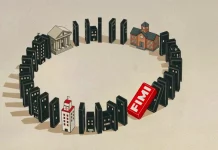By EUvsDisinfo
Well into the fourth year of Russia’s full-scale invasion of Ukraine, Moscow’s real ambitions are well-known: to control, conquer and subdue all, or as much as possible, of Ukraine. Destroy as much as possible of Ukraine’s economy, agriculture, industry, and infrastructure with no distinctions made between civilian or military targets. Kill civilians at random.
An Eternal War with the stench of a death cult
The recent celebrations marking 80 years since the end of World War II left a set of clear messages.
While most countries try to build societies where aggression and war cannot develop, today’s Russia has advanced on a trajectory where most if not all important parts of society are honed towards war. Putin’s speeches, including on 9 May, celebrate the effort as an almost religious calling, and the Russian Orthodox Church has followed suit. War has become a key raison d’être of the Putin system, so do not expect this to stop suddenly.
The latest practice by Russian state outlets of featuring war widows almost worshipping their lost husbands, brothers, or sons as sacrifices to Russia, or as carrying out their highest duty in life, marks a new level in state propaganda. Besides being an obvious attempt to keep countering what previously was a rather vocal Russian civil society group, the Committee of Soldiers’ Mothers of Russia, now hit by legal means, Russian authorities are introducing the stench of a death cult which goes hand in hand with the massive military parades that absorb the individual into the collective. It is also an obvious attempt by Moscow to gloss over and manage a self-inflicted consequence: the very high number of casualties.
On to new battles: peace negotiations
The messages above form the backdrop of Moscow’s hesitant approach to upcoming peace negotiations. The call for a 30-day unconditional ceasefire from European leaders, backed by the US and Ukraine, and President Zelenskyy’s challenge to Putin to hold direct talks in Türkiye have been met with a PR counter-offensive. Russian state and pro-Kremlin outlets demand the focus of negotiations be on the ‘root causes’ of issues between Russia and the West.
Beneath their self-assurance, Russian state outlets have betrayed a certain nervousness about the prospect of a face-to-face meeting in Türkiye with Zelenskyy and perhaps Trump. Where could this go? This concern is deflected by insisting on addressing alleged ‘root causes’. Russian state outlets were again mobilised to advance the accusation that President Zelenskyy is not legitimate or would reject a meeting, so as to downplay the expectation of a direct meeting of Putin and Zelenskyy. See also our Database for ‘peace negotiations’
‘Root causes’…
‘Root causes’ is Kremlin shorthand for obstruction, playing for time, or a flat rejection of the West’s rejection of several show-stoppers. The key ones are: Putin’s unilateral demands issued to NATO in December of 2021 (meaning a NATO roll-back to its 1997 state of pre-enlargement); under the pretext of so-called ‘de-nazification’ demand the removal of democratically elected President Zelenskyy and the Ukrainian political leadership; and Ukraine de facto being disarmed, having a neutral status, and remaining outside NATO, perhaps with weak security guarantees bordering on the pointless. Add to this the Russian claim that occupied Crimea and large parts of Eastern Ukraine are Russian territory.
More likely, the Russian approach is, first, to demand addressing so-called ‘root causes’; use that discussion to announce a ceasefire, or rather, a pause to rebuild forces; and then march on to new battles.

Also on the EUvsDisinfo radar this week:
- The Kremlin views the world through its own twisted lens, so this week it was all too quick to claim that drug addicts and immoral people rule Europe. These claims emerged after footage showed President Emmanuel Macron picking up a crumpled white object from a table while seated next to German Chancellor Friedrich Merz and British Prime Minister Keir Starmer during a late-night meeting in Kyiv. Was it a bag of drugs? Of course not. It was merely a crumpled up tissue, and French authorities quickly pointed out how absurd the Kremlin’s claims really are. This was a classic example of spreading baseless conspiracy theories alleging drug abuse, wrapped around the Kremlin’s so-called ‘hahaganda’, to discredit European efforts to work for peace. It is also a cheap way to divert attention away from important issues.
- The Kremlin also sought to sling false accusations of colonialism, claiming that the EU aims to colonise Central Asia to replace the lost Sahel region. This was an attempt to discredit the first EU-Central Asia summit and distract from Russia’s own colonial, imperialist ambitions. The EU bases its cooperation with partners on shared values, principles, and goals and the EU-Central Asia strategy outlines three priority strands for EU engagement: investing in regional cooperation and partnering for resilience and prosperity. However, Russia perceives these independent actions by sovereign Central Asian states as a threat to what it considers its ‘sphere of influence’, betraying the Kremlin’s Cold War mentality.
- Finally, Moscow played the blame game, claiming that EU High Representative Kaja Kallas’s threats expose the EU’s disrespect for WWII victims. This pro-Kremlin accusation perpetuates a revisionist view of history and could not be further from the truth. Kallas’s comments underlined the EU’s principled stance against legitimising Russia’s current military aggression by participating in Kremlin-orchestrated commemorations. This is not a campaign of ‘Russophobia’, but a defence of shared European values—democracy, peace, and respect for sovereignty. On the contrary, Russia’s current use of historical memory to justify its aggression is part of a broader campaign of historical revisionism.
Don’t be deceived!
By EUvsDisinfo





